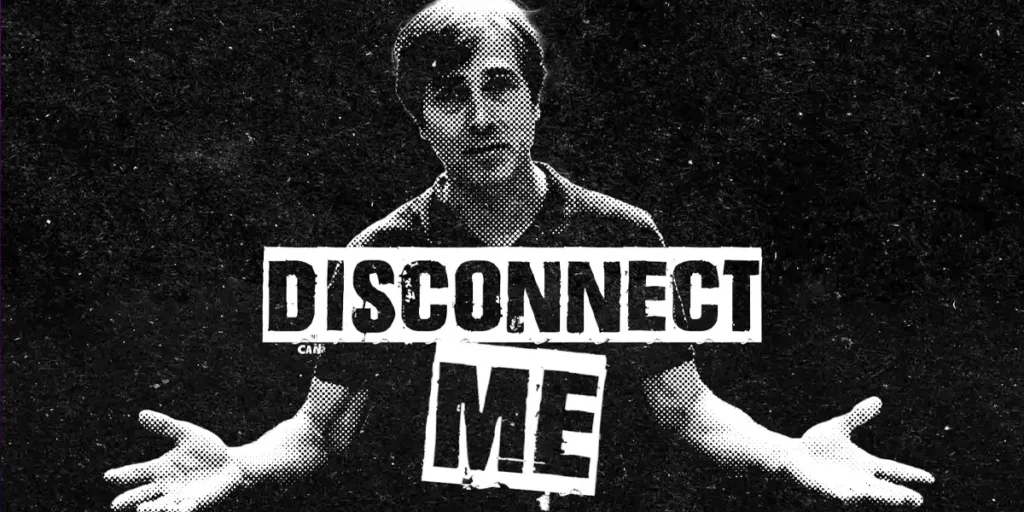Well-intentioned but unoriginal, Disconnect Me reminds us how addicted we are to our phones, but offers no solutions.
There’s a good chance you’re reading this review on a smartphone. The ubiquity of iPhones, Androids and the like is only matched by their addictiveness, and it is the latter of these phenomena that Australian writer/director Alex Lykos seeks to explore in his well-meaning but frustratingly unoriginal documentary Disconnect Me. In his examination of this most modern of vices, Lykos’ biggest accomplishment is undermining the (already dubious) format he’s chosen to examine it. Disconnect Me uses a humble approach to disguise not just a lack of ambition, but a lack of a smoking gun too. The fact that modern handheld technology is dangerous will come as no surprise to anyone, but Disconnect Me seems to think this is revelatory.
Opening with footage of the 2007 launch of the iPhone, Disconnect Me locates the source of our modern malaise in these miraculous devices. From Steve Jobs quietly beaming over his company’s revolutionary creation, we cut to the present, as Lykos lays out his desire to be free from his phone; it eats up many hours of his day, and with little to show for it. It’s a universal problem, and there can be no doubting Lykos’ intent to do something about it. His plan is to deprive himself of his phone for 30 days, and monitor how he and his body readjust to life without it. Intersperse his efforts with some talking heads to illuminate his points, and you have a documentary. Of course, for maximum effect you need a bit more than that, but Disconnect Me is content to coast on the basics.
There’s no reason to doubt that Lykos is sincere in his attempts to break his smartphone habit; after all, most of us are suffering from the same habit. Yet for all that sincerity, there is an artifice to Disconnect Me that undermines it constantly. Conversations with Lykos’ father feel cartoonish as he admonishes his son for being unreachable without a phone, while Lykos’ wife is introduced, but scarcely involved, even though she’s the person most likely to notice and appreciate any changes in her husband. The camera crew are ready and waiting to capture Lykos’ every move, no matter how staged these can feel. Like many social media posts, Disconnect Me feels like a highlight reel rather than a reflection of reality.

As the 30-day experiment goes through the motions (It starts easy, it gets tough, it gets worse, it becomes unbearable, etc.), we’re introduced one by one to various aspects of life that are disrupted or damaged by our phone use. There is no harm in reminding people that children learn habits from parents, or that social media use in teenagers causes them to distrust relationships, but these facts are widely known at this point. Increased levels of gambling and sexting, and slipping grades are a reality with these machines, but Disconnect Me is more interested in the shocking nature of these problems than in finding solutions to them.
As in the similarly-themed The Social Dilemma, the issues Disconnect Me raises are far more attention-grabbing. Ironically enough, the film has to work against the diminished attention spans of its audience. Coupled with Lykos’ unshowy but slick presentation, the lack of answers leaves Disconnect Me without any critical heft. There’s no bite behind its timely bark.
This breed of agitprop documentary is nothing new (Michael Moore has made a living off this kind of angry righteousness for 40 years), but Lykos’ approach is lifted wholesale (right down to the title) from Morgan Spurlock’s 2004 fast food exposé Super Size Me. For all its positive effects on the fast food market, Super Size Me has been rightly re-evaluated in hindsight for its lack of scientific rigor, and its use of shock tactics to make its point.
Like Spurlock before him, Lykos believes the message he wishes to convey justifies his methods, but Disconnect Me doesn’t have the same shock value of Super Size Me to engage the viewer. When Spurlock committed to eating nothing but McDonald’s products for thirty days, we’d be hooked to see the resulting damage. When Lykos locks his smartphone away for the same period, there’s no risk involved. If anything, we wish we could do the same thing, but Disconnect Me is too pat to be inspiring.
If Disconnect Me inspires a few members of its audience to try a digital detox, Alex Lykos will likely be happy with its impact. The film’s scope, as reflected in its Aussie-centric focus and its solo test subject, is too small to feel consequential. There are more operational smartphones in the world than people, and Disconnect Me is too limited to impact those figures.
Disconnect Me will premiere exclusively on The Icon Film Channel from February 26, 2024 and will be available to watch on digital platforms from April 1.

